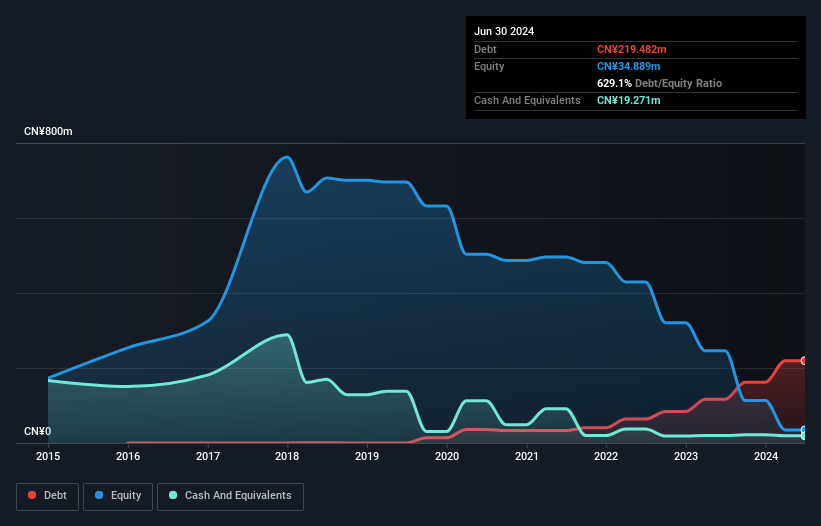- Hong Kong
- /
- Specialty Stores
- /
- SEHK:2122
Is Kidsland International Holdings (HKG:2122) Using Debt In A Risky Way?

David Iben put it well when he said, 'Volatility is not a risk we care about. What we care about is avoiding the permanent loss of capital.' When we think about how risky a company is, we always like to look at its use of debt, since debt overload can lead to ruin. We can see that Kidsland International Holdings Limited (HKG:2122) does use debt in its business. But is this debt a concern to shareholders?
What Risk Does Debt Bring?
Debt assists a business until the business has trouble paying it off, either with new capital or with free cash flow. Ultimately, if the company can't fulfill its legal obligations to repay debt, shareholders could walk away with nothing. While that is not too common, we often do see indebted companies permanently diluting shareholders because lenders force them to raise capital at a distressed price. Of course, the upside of debt is that it often represents cheap capital, especially when it replaces dilution in a company with the ability to reinvest at high rates of return. The first step when considering a company's debt levels is to consider its cash and debt together.
Check out our latest analysis for Kidsland International Holdings
How Much Debt Does Kidsland International Holdings Carry?
You can click the graphic below for the historical numbers, but it shows that as of June 2024 Kidsland International Holdings had CN¥219.5m of debt, an increase on CN¥116.6m, over one year. However, it does have CN¥19.3m in cash offsetting this, leading to net debt of about CN¥200.2m.

How Healthy Is Kidsland International Holdings' Balance Sheet?
Zooming in on the latest balance sheet data, we can see that Kidsland International Holdings had liabilities of CN¥352.5m due within 12 months and liabilities of CN¥143.0m due beyond that. On the other hand, it had cash of CN¥19.3m and CN¥104.3m worth of receivables due within a year. So its liabilities outweigh the sum of its cash and (near-term) receivables by CN¥372.0m.
The deficiency here weighs heavily on the CN¥22.6m company itself, as if a child were struggling under the weight of an enormous back-pack full of books, his sports gear, and a trumpet. So we definitely think shareholders need to watch this one closely. After all, Kidsland International Holdings would likely require a major re-capitalisation if it had to pay its creditors today. There's no doubt that we learn most about debt from the balance sheet. But you can't view debt in total isolation; since Kidsland International Holdings will need earnings to service that debt. So if you're keen to discover more about its earnings, it might be worth checking out this graph of its long term earnings trend.
In the last year Kidsland International Holdings had a loss before interest and tax, and actually shrunk its revenue by 4.9%, to CN¥1.1b. That's not what we would hope to see.
Caveat Emptor
Over the last twelve months Kidsland International Holdings produced an earnings before interest and tax (EBIT) loss. Its EBIT loss was a whopping CN¥173m. Reflecting on this and the significant total liabilities, it's hard to know what to say about the stock because of our intense dis-affinity for it. Like every long-shot we're sure it has a glossy presentation outlining its blue-sky potential. But the reality is that it is low on liquid assets relative to liabilities, and it lost CN¥208m in the last year. So we think buying this stock is risky. There's no doubt that we learn most about debt from the balance sheet. But ultimately, every company can contain risks that exist outside of the balance sheet. We've identified 3 warning signs with Kidsland International Holdings , and understanding them should be part of your investment process.
Of course, if you're the type of investor who prefers buying stocks without the burden of debt, then don't hesitate to discover our exclusive list of net cash growth stocks, today.
Valuation is complex, but we're here to simplify it.
Discover if Kidsland International Holdings might be undervalued or overvalued with our detailed analysis, featuring fair value estimates, potential risks, dividends, insider trades, and its financial condition.
Access Free AnalysisHave feedback on this article? Concerned about the content? Get in touch with us directly. Alternatively, email editorial-team (at) simplywallst.com.
This article by Simply Wall St is general in nature. We provide commentary based on historical data and analyst forecasts only using an unbiased methodology and our articles are not intended to be financial advice. It does not constitute a recommendation to buy or sell any stock, and does not take account of your objectives, or your financial situation. We aim to bring you long-term focused analysis driven by fundamental data. Note that our analysis may not factor in the latest price-sensitive company announcements or qualitative material. Simply Wall St has no position in any stocks mentioned.
About SEHK:2122
Kidsland International Holdings
An investment holding company, trades and sells toys and related lifestyle products in Mainland China, Macau, and Hong Kong.
Medium-low and slightly overvalued.
Market Insights
Community Narratives



